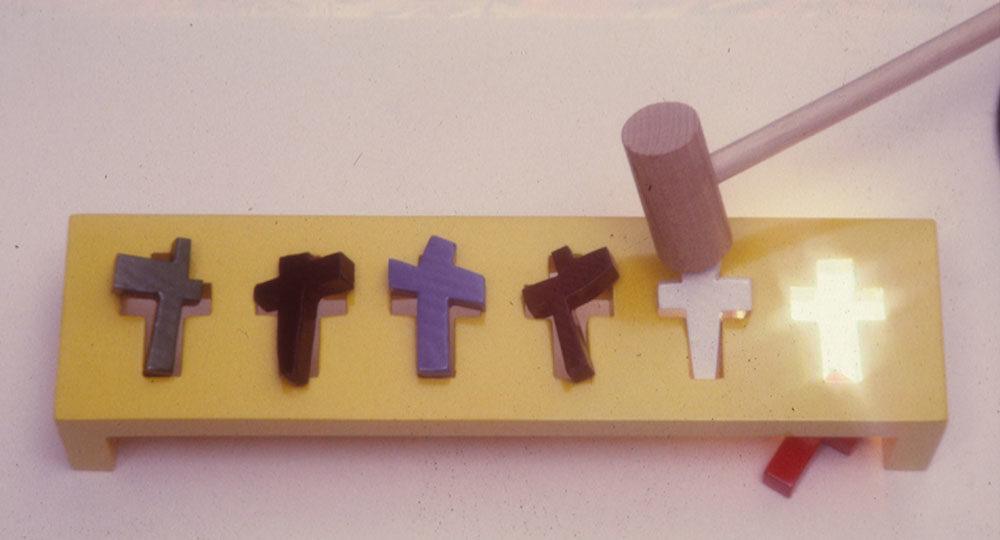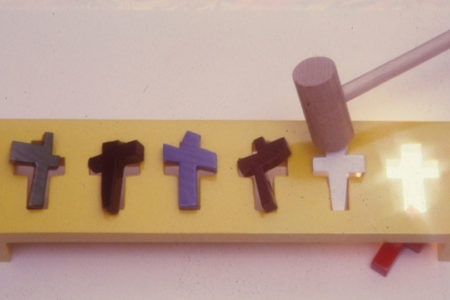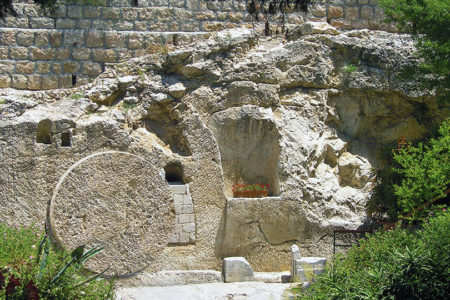Who Is the True Messiah?
We nearly fell out of our cushioned synagogue seats when we heard the rabbi’s answer! I had accompanied a group of believers from a suburban Detroit church to a conservative synagogue to learn more about Jewish beliefs and customs. We had been given an excellent tour, and now the rabbi was answering questions. One member of our group inquired, “What do Jews believe about the Messiah?” The rabbi’s startling answer was, “God has delivered the Jewish people from many trials during our history, and He will deliver us also from the Messiah!” After we had recovered from our shock, we inquired further about the meaning of his strange answer. The rabbi then elaborated on the numerous false Messiahs who have appeared to Israel over the centuries. These pseudo-Messiahs inflicted much pain on the Jewish community by falsely raising many hopes and aspirations and then shattering them. The damage they inflicted has been so great that many Jews no longer believe in a personal Messiah. The rabbi included himself among these doubters.
Over two dozen individuals have claimed to be the Messiah of the house of Israel over the past 1,900 years. They represent a wide variety of Jews from many different areas, but all of them have one trait in common—they were wrong! Following are descriptions of some of the most colorful.
Simon ben Kozeba, called Bar Kochba by Rabbi Akiba, led an unsuccessful civil war in Israel against the Romans from 132 to 135 A.D. He was killed in his stronghold of Betar, and Rabbi Akiba was later executed by the Romans.
Dand Alroy announced himself as the Messiah to the Jews of Babylon in 1147. He summoned his followers to revolt against the Persian king and then capture Jerusalem, but he was soon assassinated by his father-in-law.
Abraham Abulafia, a learned mystic, announced himself as the Messiah to the Jews of Sicily in 1284. Failing to gain a following among them, he turned to the Christian world to accept his spiritual program for the liberation of Jerusalem from Moslem rule. Having been rebuffed again, he simply disappeared in 1291.
Solomon Molko, a Portugese Marrano, traveled from his native home to Italy, Turkey, and Palestine, seeking to arouse interest in a joint Jewish/Christian mission to free the Holy Land. After presenting himself as Messiah in Greece in 1530, he was arrested, tried by the Inquisition for conversion to Judaism, and burned at the stake.
Shabbetai Zvi, the most famous and successful pseudo Messiah in Jewish history, gained thousands of followers all over Europe by 1665. This native of Smyrna, Turkey, boldly demanded from the Turkish sultan that he be allowed to lead the Jewish people back to the Holy Land. The sultan, however, imprisoned Zvi in 1666, and soon thereafter his crushed devotees heard the terrible news that their messiah had actually converted to Islam! He died in exile ten years later.
The foregoing pseudo-Messiahs are only the most prominent—many others have raised the hopes of some only to dash them in disappointment. Combined with a growing secularism over the past 200 years, this sad history of messianic pretenders has had a notable effect on the messianic views of many Jewish people. Today most Jewish people do not believe in any personal messiah—past, present, or future. Some affirm belief in a future messianic age, when peace among nations will prevail, but it will be a messianic age without a Messiah. Only the small group of orthodox Jews believe that some day the Messiah will personally arrive. They tenaciously hold to one of the 13 principles laid down by Maimonides in the 12th century: “I believe with perfect faith in the coming of the Messiah, and though He tarry, I will wait daily for His coming.” Many orthodox, however, are not clear about whether such a belief is essential to Judaism.
Apart from being wrong, each of the pseudo-Messiahs had one other factor in common—none of them met the qualifications given in the Hebrew Scriptures which would characterize the Messiah. Most of them ignored these biblical qualifications and based their messianic claims on so-called miracles, supposed visions, and involved numerical calculations based on Kabbalah (Jewish mysticism). Had the people measured them by biblical standards, they would not have been deceived. What are the qualifications for the Messiah and, more importantly, has there ever been anyone who measures up to them?
Although the Tenach (the Hebrew Scriptures) mentions many messianic qualifications, the following four are most crucial in determining who indeed is the real Messiah.
The Place of His Coming
Micah 5:2 (5:1 in the Hebrew Bible) reads, “But thou, Bethlehem Ephrathah, though thou be little among the thousands of Judah, yet out of thee shall he come forth unto me that is to be ruler in Israel, whose goings forth have been from of old, from everlasting.” This verse simply states that the ruler in Israel will come from Bethlehem Ephrathah in Judah. Although He came out of Bethlehem, He did not have His beginning there, for He is an everlasting person.
God’s Word is very precise about this qualification. There were two Bethlehems in ancient Israel—one in Judah (1 Sam. 16:4) and one in Galilee (Josh. 19:15). Micah 5:2 clearly states, however, that the Messiah will come from Bethlehem in Judah. The ancient scribes and rabbis agreed that this Bethlehem was to be the birthplace of the Messiah, and they related this information to Herod the Great when he asked for it (Mt. 2:4–6). This birth in Bethlehem, however, does not mean that Messiah is of human origin only, for Micah also said His “goings forth have been from of old, from everlasting.” The notion that Messiah is nothing more than a gifted man is contradicted by this plain statement declaring His eternal preexistence—an attribute belonging only to the Lord God (cp. Hab. 1:12). Even the Talmud and a rabbinic commentary on Genesis state that the name of Messiah existed before the creation of the world (Pesahim 54a, Genesis Rabbah 1:4).
So the first characteristic of Messiah is that He will be an eternal being who will come out of Bethlehem in His earthly existence.
The Manner of His Coming
A divine being who comes to earth as a human being would have to experience a supernatural birth. The Bible therefore teaches that the Messiah would be born of a virgin—clearly an event involving the miraculous. Isaiah 7:14 states, “Therefore the Lord himself shall give you a sign; Behold, the virgin shall conceive, and bear a son, and shall call his name Immanuel.” The controversy surrounding this verse hinges on the word translated as “virgin.” It is the Hebrew word almah, and some insist that it should be translated young woman without implying virginity, because the normal Hebrew word for virgin is betoolah. Although this line of reasoning seems to have a scholarly, authoritative tone to it, a closer examination reveals that virgin is a very legitimate translation of almah in this verse.
The word almah appears only seven times in the Hebrew Bible (Gen. 24:43; Ex. 2:8; Ps. 68:25; Prov. 30:19; Song 1:3; 6:8; Isa. 7:14). There is no instance in which it can be proven that almah designates a young woman who is not a virgin. Particularly obvious is its use to describe the virgin Rebekah in Genesis 24:43 (cp. Gen. 24:16) and the virgin Miriam in Exodus 2:8. The use of the word indicates that it refers to a young woman, one of whose characteristics is virginity. This is borne out by the fact that the Septuagint, the Greek translation of the Hebrew Scriptures completed around 200 B.C., renders almah in Isaiah 7:14 by the Greek word for virgin, parthenos.
Furthermore, the extraordinary nature of this birth is indicated by the “sign”: “Therefore the Lord himself shall give you a sign; Behold, the virgin shall conceive, and bear a son, and shall call his name Immanuel.” A sign in Scripture is something out of the ordinary that attests to and confirms a word from God. Most of the 80 occurrences of this word in the Old Testament refer to miraculous signs (e.g., Ex. 7:3; Dt. 4:34; Isa. 20:3). With this in mind, it is appropriate to ask, What is so miraculous and out of the ordinary about a young woman conceiving and bearing a child? That happens all the time. It would be miraculous, however, if a virgin conceived.
The child born through this miraculous birth is given the name Immanuel, which is comprised of three Hebrew words literally translated “with us God” (cp. Mt. 1:23).
The second characteristic of the Messiah is, therefore, that He will have a miraculous birth from a virgin mother and that He will be God in human form.
The Time of His Coming
Calculations purporting to indicate the exact dates of prophetic events have abounded throughout history. Some pseudo-Messiahs claimed that the year of their unveiling to Israel was determined by secret numerical calculations arrived at through the mysterious practice of gematria (i.e., calculating numbers through letters).
Needless to say, the Bible knows nothing of this practice. The general time of Messiah’s coming however, was revealed to Daniel in chapter 9, verses 24–27. Although there is room for disagreement on the exact details of this prophecy, it is clear that the appearing of “Messiah, the Prince” (Dan. 9:25) would be early in the fourth decade of the first century. It is absolutely clear, however, that the Messiah had to come before the destruction of the Temple:
And after threescore and two weeks shall Messiah be cut off, but not for himself; and the people of the prince that shall come shall destroy the city and the sanctuary, and the end of it shall be with a flood, and unto the end of the war desolations are determined (Dan. 9:26).
The destruction of Jerusalem and the Temple took place in 70 AD. at the hands of the Roman general Titus and his legions. Daniel 9:26 is teaching, therefore, that the Messiah had to come before 70 A.D.
Therefore, the third characteristic of Messiah is that He had to come and be “cut off” before the Temple’s destruction in 70 A.D.
The Purpose of His Coming
A Jewish person who is asked “What is the purpose of Messiah’s coming?” would probably respond, “To bring peace to the world and to restore the Jewish people from their exile.” These themes of universal peace and restoration are mentioned often by the Hebrew prophets. Another prophetic theme, often overlooked, describes an additional purpose of Messiah’s coming—to die for the sins of Israel and of all mankind.
No greater elaboration of this theme can be found than in the Servant Song of Isaiah 52:13–53:12. This section of Scripture is one of a series depicting the work of the servant of the Lord in Isaiah. At times this servant is Israel (e.g., Isa. 44:1–2), but at other times the servant is an individual who will restore Israel to the Lord (Isa. 49:5–7). In Isaiah 53:4–6 the personification of the Suffering Servant reaches a sublime pinnacle:
Surely he hath borne our griefs, and carried our sorrows; yet we did esteem him stricken, smitten of God, and afflicted. But he was wounded for our transgressions, he was bruised for our iniquities; the chastisement for our peace was upon him, and with his stripes we are healed. All we like sheep have gone astray; we have turned every one to his own way, and the Lᴏʀᴅ hath laid on him the iniquity of us all.
The servant suffered submissively and silently, and the suffering was vicarious (i.e., for the sins of others). His soul became “an offering for sin” (Isa. 53:10).
The Babylonian Talmud, the Aramaic Targums, and the ancient rabbinic commentaries identified this Suffering Servant as Israel’s Messiah. Typical of their comments is that of Moshe Kohen ibn Crispin, a 14th-century Spanish rabbi:
This prophecy was delivered by Isaiah at the divine command for the purpose of making known to us something about the nature of the future Messiah, who is to come and deliver Israel … in order that if anyone should arise claiming to be himself the Messiah, we may reflect and look to see whether we can observe in him any resemblance to the traits described here: if there is a resemblance, then we may believe that he is the Messiah our Righteous but if not, we cannot do so.
The modern Jewish view of the servant of Isaiah 53, however, is that he is a personification of suffering Israel, rather than the Messiah. This interpretation was first introduced cat 1100 by the great French rabbi Shlomo Yitzaki referred to as Rashi. Even though most commentators adopted this novel Israel interpretation, many rejected it. As late as the 17th century, Rabbi Naphtali Altschuler wrote, “I am surprised that Rashi and David Kimchi have not, with the Targum, also applied them (vv. 5213–53:12) to the Messiah.”
However, Isaiah 53 itself refutes the Israel interpretation and affirms that the servant must be an individual who suffers for Israel. In verse 8b, Isaiah stated, “for the transgression of my people was he stricken.”
Question: Who were Isaiah’s people?
Answer: Israel.
Problem: How could Israel be “stricken” for Israel?
Taking the words of this marvelous chapter in their normal, literal context demands that they describe the substitutionary suffering of an innocent servant for the sins of Israel.
The fourth characteristic of the Messiah is, therefore, that the purpose of his coming is to give His life as a substitutionary sacrifice for the sins of others so that they may be forgiven. However, He would be rejected by His own people.
There are many other prophecies concerning the Messiah’s identity and work. He would be a descendant of David in the tribe of Judah (Gen. 49:10; Jer. 23:5–6). He would be preceded by a forerunner (Mal. 3:1); He would perform miracles of healing (Isa. 35:5–6); He would be crucified (Ps. 22:16); He would rise again from the dead (Ps. 16:10); and He would ascend to the right hand of Jehovah (Ps. 110:1).
Is there anyone in Jewish history who meets these qualifications? Certainly not Bar Kochba, or Shabbetai Zvi or any of the other messianic impostors—past, present, or future. But there is One who fits the composite figure drawn by the Hebrew prophets. His name was Yeshua ben Yosef. We know Him in the best as Jesus of Nazareth. He was born in Bethlehem of a virgin mother (Mt. 1:23; 2:1). He appeared publicly in the early years of the fourth decade in the first century (Lk. 3:1–2, 21). He was rejected by the greater part of the Jewish nation, died on a Roman cross, rose again the third day, and later ascended to His Father (Jn. 1:11; Mt. 27:35; 28:1ff; Acts 1:9). He fulfilled these and dozens of other specific prophecies.
The title of this article asks the question, “Who is the true Messiah?” To the person who bothers to investigate the question, the answer is clear: Jesus, the One born in Bethlehem to a virgin mother, the One who suffered as a sacrifice for Israel and the world 40 years before the destruction of the Temple.
Will you trust Him as your Messiah and sin bearer today?








